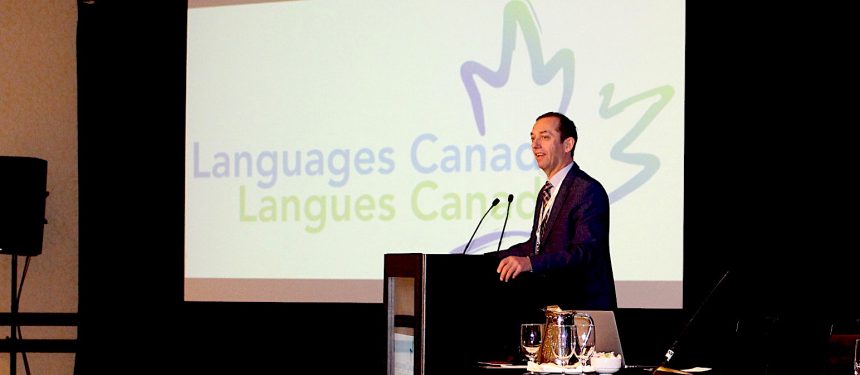Discussions around diversification, the central role of languages in internationalisation and upcoming changes to student visas kept the 180 attendees at the annual Languages Canada conference busy across the three-day event, held for the first time in Manitoba’s capital, Winnipeg.
News and business analysis for Professionals in International Education
Have some pie!
Languages Canada conference spotlights diversity and visa changes
 LC executive director Gonzalo Peralta addressing the attendees. Photo: The PIE News
LC executive director Gonzalo Peralta addressing the attendees. Photo: The PIE News New national strategy and restoring access to work for language students were also earmarked as priorities for the association, along with continued monitoring of the implementation of newly introduced biometrics requirements.
“Canada should celebrate that international education is getting that kind of attention”
“Our focus on diversification is not just of source markets but also on the types of opportunities for our members, going beyond student recruitment to tapping into opportunities for in-country capacity building,” LC’s director of international affairs and operations Rachel Lindsey told The PIE News.
A spotlight was also on advocacy and international affairs after the Saudi crisis shook the industry in 2018.
While a panel discussed the role of provincial and federal organisations in the promotion of the country, and the way forward after Canada reached its 2022 goal in 2017, presentations from delegations from Mexico, Brazil and Colombia put an accent on international partnerships and in language education.
One program that is being piloted in collaboration with Languages without Borders in Brazil tapped into outward student mobility, with an emphasis on building capacity for language education in host institutions.
Six Brazilian students will travel to Canada to support Portuguese language education, while six Canadian students will support English language learning in Brazil.
Two students at UNESPI in Sao Paolo will support the development of English-medium instruction at the engineering faculty.
“Using the pilot as a foundation piece, we will develop an online certificate which will help equip Canadian students to play that role as teaching assistant,” explained Lindsey.
“We know there is an appetite for building a larger-scale program in Brazil and now we are having these conversations with Colombia as well and Mexico, another partner country.”
Another pilot program in the pipeline concerns access to work for language students, which LC executive director Gonzalo Peralta defined a “top priority” for the association’s advocacy efforts.
The program, offering experiential learning to language students, will be piloted in Nova Scotia and Manitoba, hoping to get the rest of the country on board, he told The PIE.
“Without access to work, our offer is just not complete”
“We are working more closely with the provinces rather than the federal government on this. This is the first step for us: let us do what we are here to do. Without access to work, our offer is just not complete,” he added.
“We are hoping of course that the federal government will see the value of it because they get to open or close the door.”
A number of trade commissioners from Poland, Ukraine, Mexico, Colombia, China and Egypt were present at the conference and engaged in back-to-back meetings with attendees, from which they emerged to give market insight to a full plenary room.
“They come from countries where we are going to be active over next year, we want to help our members make decisions around where they want to go,” Peralta explained, adding that the association has missions planned to Iran, Thailand and Russia, and one to China for French programs.
On education and migration, a presentation by IRCC representatives introduced attendees to two likely changes to student visas: an extension of the Student Direct Stream to all countries in April, and the possibility for students to keep the same study permit for both prerequisite course and main program.
The presentation drew applause – but the changes haven’t been officially confirmed and will be announced publicly in due course, IRCC told The PIE.
“Our focus on diversification goes beyond student recruitment”
This was the first industry conference Winnipeg is scheduled to host in 2019, with CAPS-I and CBIE taking place later on in the year. The provincial government has proclaimed 2019 the year of international education.
“All of Canada should celebrate that international education is getting that kind of attention,” the association’s president Cath D’Amico added.
The association’s new membership criteria which were announced at the conference last year are currently being implemented and will be evaluated in 2020.
Still looking? Find by category:



Awesome post.